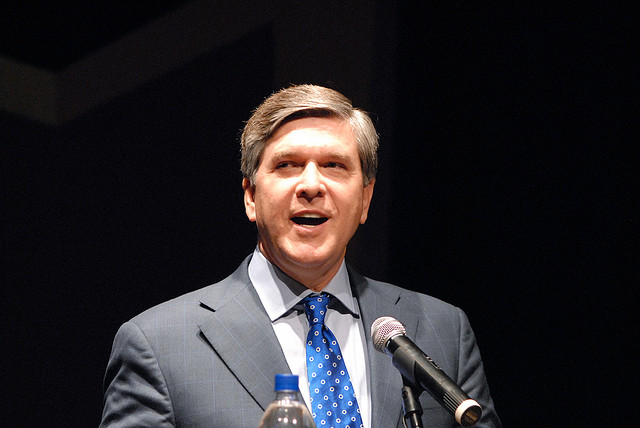TV broadcasters sue the FCC over upcoming spectrum auction | Ars Technica

Gordon Smith, president and CEO of the National Association of Broadcasters and a former US senator from Oregon.
On Monday the National Association of Broadcasters (NAB) filed a petition asking a federal court to object to the Federal Communications Commission's (FCC) rules for an upcoming auction of TV airwaves to cellular providers. Although lawsuits challenging FCC actions are relatively common, if the court sides with the NAB, the 2015 spectrum auction could be delayed, and promises of improvements to cellular networks could prove illusory.
Further Reading
The auction, which was mandated by Congress two years ago, is the first of its kind, and it has TV broadcasters bristling. The FCC has been asking TV stations to give up their airwaves in exchange for a cut of the auction proceeds, at which point participating stations can either go out of business or “channel share,” an arrangement where two stations occupy the same airwaves. Still, vigorous lobbying on behalf of the broadcast industry ensured that all participation in the auction would be voluntary.In the NAB's lawsuit today, the industry group said that it was unhappy with the protections the FCC had put in place for those TV stations that chose not to participate in the auction. In 2012, Congress ordered that after participating TV stations had relinquished their rights to their airwaves, the commission would reorder the spectrum, being careful to preserve the remaining broadcasters' coverage areas as much as possible. At the time of the congressional order, the FCC had relied on a specific methodology to determine a broadcaster's coverage area, but in June of this year, the FCC switched to another methodology, which the NAB says is unacceptable.
“Under this new methodology, many broadcast television licensees, including NAB's members, will lose coverage area and population served during the auction's repacking and reassignment process, or be forced to participate in the auction (and relinquish broadcast spectrum rights),” the NAB's complaint reads. According to The Wall Street Journal, the broadcasters group is worried that some stations could have to pay as much as $500 million to cover their expenses during the FCC's efforts to “repack” the airwaves.
Still, the NAB seems amenable to negotiation. A broadcast industry source speaking to the WSJ said that “the FCC could potentially convince the NAB to drop its lawsuit by increasing the $1.75 billion set aside to compensate broadcasters for repacking, and making more of an effort to ensure that stations won't see their coverage areas significantly reduced.”
In April, FCC Chairman Tom Wheeler attended the NAB's annual conference in Las Vegas, where he told struggling TV stations that the auction would be a quick and easy way for them to get capital for more future-oriented projects, like building apps or serving content online. But he faced a tough and skeptical crowd. “There is no conspiracy,” Wheeler said in April of the spectrum auction. “Those who want to participate, can. Those who don’t want to participate, that’s fine. We’re developing an outreach plan that will provide you with detailed information to help you make the right decision.”
NAB President and CEO Gordon Smith also addressed the conference attendees about the upcoming spectrum auction in April, saying, “NAB has worked tirelessly for the past year-and-a-half to help the FCC deliver on Congress’ direction to hold a voluntary broadcast spectrum incentive auction… Let's face it, the incentive auction will affect the TV broadcast industry far more than any other industry. Ours is the only industry the auction can actually harm.”